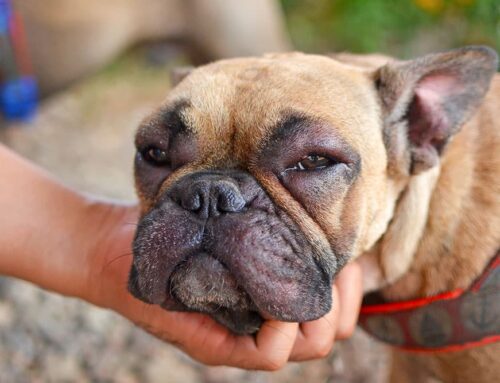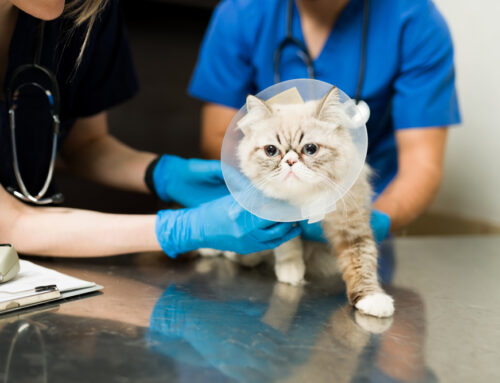How do you know when your four-legged family member requires emergency veterinary care? Assessing your pet’s degree of pain or the urgency of the situation can be difficult. When in doubt, contact the Stack Veterinary Hospital team for guidance on whether your pet needs to be seen on an emergency basis, or can wait for a regular appointment. Here are nine situations that may warrant immediate veterinary attention.
#1: Trauma to pets
If your pet is hit by a car but appears uninjured, they still need to be checked for internal damage right away. Bite wounds from another animal, or a bleeding laceration, also can be deeper and more serious than they appear. An emergency veterinary examination can determine the extent of your pet’s injuries to provide them with the most appropriate medical treatment.
#2: Pets with breathing difficulties
If your pet has an occasional cough, call us for an appointment. However, if your pet is choking, stretching their neck to breathe, or breathing rapidly or open-mouthed, or has exaggerated chest movements, time is of the essence. If your pet’s gums are pale, blue-tinged, or gray, they are in critical danger.
#3: Toxin ingestion in pets
If your pet has eaten something toxic, the ASPCA Animal Poison Control Hotline or Pet Poison Hotline is available 24 hours per day. They will provide advice on whether your pet needs immediate care, and a case number to help guide your pet’s medical treatment, which our team will require if your pet needs to be seen. Ingesting the following toxic substances can warrant immediate veterinary attention:
- Rat, ant, or snail bait
- Anti-freeze
- Household items such as paint, glue, or cleaning products
- Insecticides and garden products
- Human medications
- Human foods such as grapes, raisins, xylitol, onions, macadamia nuts, or garlic
- Raw dough or drinks containing yeast
- Chocolate, especially dark or baker’s chocolate
- Toxic plants
#4: Pets who are unable to urinate
If your pet is unproductively straining to urinate, this can be a medical emergency. Cats in particular can develop a life-threatening urinary blockage that results in a toxin buildup in their body. Urinary blockages are less common in dogs, but can occur if they have bladder stones or cancer.
#5: Excessive vomiting in pets
Although every vomiting episode may not be cause for concern, seek immediate care if your pet vomits multiple times in a 24-hour period, or is getting worse. Unproductive retching can signal bloat, or a twisted stomach, which can quickly become fatal, and requires emergency veterinary attention.
#6: Acute pain or mobility loss in pets
Signs of pain include vocalizing, shaking, hiding, avoiding contact, or irritability. The sudden onset of severe lameness can suggest a fracture, dislocation, or ruptured ligament. If your pet is unable to walk, walking as if they are drunk, holding their head down, or hunching their back, they may have a spinal cord compression caused by a herniated disc in their neck or back. A lack of mobility can also be caused by a fibrocartilaginous embolism in dogs or a saddle thrombus in cats. A veterinarian can immediately assess the underlying cause, and provide pain relief and a better chance for recovery.
#7: Seizuring pets
A seizure in your dog or cat is an electrical disturbance in their brain that can be caused by several conditions, including brain injury, toxicity, tumor, or epilepsy. Call us for an appointment if your pet has one short seizure, but seek immediate emergency care if their seizure lasts longer than five minutes, or if they have multiple seizures in a 24-hour period.
#8: Pets with eye injuries

If your pet is squinting or pawing at their eye, they could have a scratched cornea or foreign material stuck under their eyelid. Red or cloudy eyes can indicate a corneal injury, or glaucoma, which is a painful condition that may lead to blindness. Eyes are extremely sensitive, and any injuries may be considered urgent.
#9: Allergic reactions in pets
Your pet can develop itching, hives, vomiting, or diarrhea from an allergic reaction to an insect sting or vaccine. Allergic reactions can progress to facial swelling, difficulty breathing, or collapse from anaphylaxis, and should be evaluated right away.
Our furry friends can get into all kinds of trouble, but you should especially watch out for these nine pet emergencies. If you think your pet needs emergency care, contact the Stack Veterinary Hospital team and we will guide you on the urgency of the situation. If your pet emergency is after hours, contact the Veterinary Medical Center of CNY for immediate care.







Leave A Comment